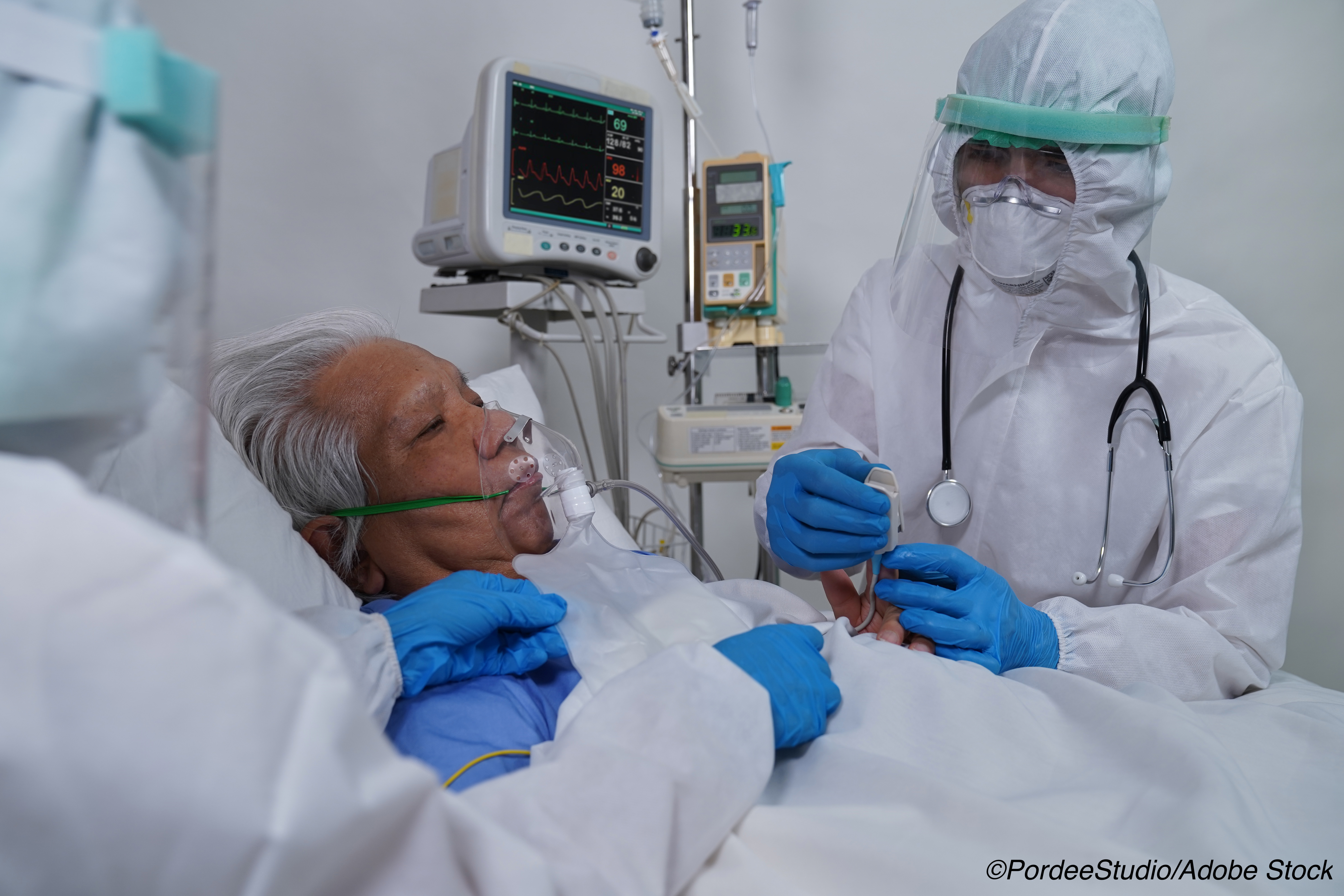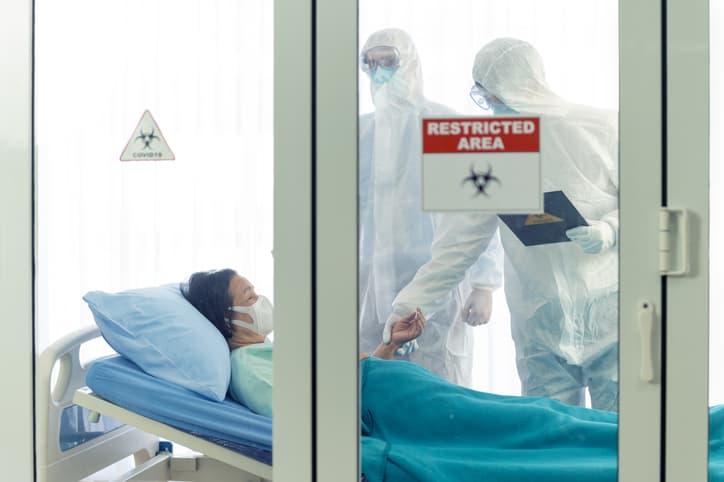
Coma and delirium were commonly reported in critically ill Covid-19 patients treated in intensive care units, and duration of sedative use was prolonged in an international study, with two-thirds of patients receiving benzodiazepines and propofol for a median of 7 day.
ICU-treated Covid-19 patients were kept in comas for a median of 10 days compared to a median of 1 day reported for patients without Covid-19, and delirium was also more prolonged than reported in studies of non-Covid-19 ICU patients with respiratory failure.
Patient interaction with family, even when delivered virtually, was associated with a lower risk for delirium (odds ratio 0.73, 95% CI, 0.63-0.84; P<0.0001).
Findings from the multicenter cohort study involving patients admitted to ICUs with Covid-19 in 14 countries from late Jan. to late April 2020 were published online in The Lancet Respiratory Medicine.
Researchers Brenda T. Pun, DNP, RN, of Vanderbilt University Medical Center, Nashville, and colleagues found that delirium and coma lasted twice as long in the study group compared to the general ICU patient population — and this prolonged period of acute brain dysfunction “is a potential predictor of worse long-term outcomes of these survivors.”
“The overuse of benzodiazepine sedative infusions and lack of family visitation (either in person or virtual) were associated with more delirium and thus, strategies to modify these approaches might mitigate delirium and any associated sequelae,” they wrote.
A total of 2,088 patients admitted to 69 ICUs with Covid-19 across Europe, North America, Central America, South America, and Africa between Jan. 20 and April 28, 2020 were included in the study cohort (median age, 64 years; IQR, 54-71), including 1,397 (66.9%) who received invasive mechanical ventilation on the day of ICU admission. Close to 9 in 10 patients (87.5%) received invasive ventilation at some point during hospitalization.
Infusion with sedatives while on mechanical ventilation was common, with 1,337 (64.0%) patients given benzodiazepines for a median of 7.0 days (4.0-12.0) and 1,481 (70.9%) given propofol for a median of 7.0 days (4.0-11.0).
Median Richmond Agitation–Sedation Scale score while on invasive mechanical ventilation was –4 (–5 to –3), with 1,704 (81.6%) patients remaining comatose for a median of 10.0 days (6.0-15.0) and 1,147 (54.9%) delirious for a median of 3.0 days (2.0-6.0).
A total of 601 (28.8%) patients died within 28 days of admission, with most of those deaths occurring in the ICU.
Among the other main findings:
- Mechanical ventilation, use of restraints, and benzodiazepine, opioid, and vasopressor infusions, and antipsychotics were each associated with a higher risk of delirium the next day (all P≤0.04).
- During the 21-day study period, patients were alive without delirium or coma for a median of 5.0 days (0.0-14.0).
- At baseline, older age, higher SAPS II scores, male sex, smoking or alcohol abuse, use of vasopressors on day 1, and invasive mechanical ventilation on day 1 were independently associated with fewer days alive and free of delirium and coma (all P<0.01).
“More than 50% of patients had a median of 2 days of hyperactive delirium (IQR, 1.0-4.0), which is higher than that reported previously,” the researchers wrote. “Such prolonged periods of acute brain dysfunction have negative implications for impaired survivorship of patients with Covid-19. Patients with acute brain dysfunction are at high risk of developing ICU associated dementia and associated post-intensive care syndrome, which affects quality of life and should be avoided by using lighter targeted sedation if possible.”
The researchers noted that Covid-19 outbreaks have strained the resources of ICUs, and this likely contributed greatly to the increased prolonged sedation and the scarce use of evidence-based strategies to reduce ICU delirium.
Such strategies include light sedation techniques, spontaneous awakening and breathing trials, avoidance of benzodiazepines, early mobility and increased family visitation.
“We found that risk of delirium among patients with severe Covid-19 was lower when benzodiazepine sedative infusions were avoided and family was present, whereas greater severity of illness and greater respiratory support was associated with a higher risk of delirium,” Pun and colleagues wrote.
In commentary published with the study, anesthesiologist and delirium researcher Valerie Page of Watford General Hospital, Watford, U.K., wrote that prior to the Covid-19 pandemic the reported incidence of new agitated delirium was around 13%, with an overall prevalence of up to 20% in critically ill adults treated in ICUs.
“In this cohort study, more than 50% of patients had hyperactive delirium,” she wrote, adding that in another recent small study of consecutive Covid-19 ICU patients, the agitated delirium incidence was 69% following cessation of muscle relaxant and sedation.
“Agitation on emergence from sedation combined with a shortage of resources might partly explain the shift in practice observed from minimal sedation to maintenance of deep sedation,” Page wrote. “These results also suggest that encephalopathy resulting from Covid-19 infection, when it manifests as delirium, is different because it results in symptoms of hyperactive rather than hypoactive delirium.”
Page acknowledged that it may be unrealistic to expect clinicians to safely maintain light sedation in a large percentage of severely ill patients with Covid-19, and that “the optimal approach to sedation in Covid-19 remains uncertain.”
But she maintained that “available evidence-based practice outside the context of Covid-19 should form the basis of the approach to delirium management.”
“As the severity of Covid-19 illness is modified with reduced viral load, reduction in risk factors, and earlier presentation, and more is understood about encephalopathy caused by Covid-19, clinicians might be able to safely manage the majority of these patients without the use of deep sedation,” Page wrote.
- Coma and delirium were commonly reported in critically ill Covid-19 patients treated in intensive care units, and duration of sedative use was prolonged in an international study, with over 50% of patients experiencing delirium and over 80% being comatose.
- Two-thirds of critically ill Covid-19 patients were treated with benzodiazepines and propofol for a median of 7 days.
Salynn Boyles, Contributing Writer, BreakingMED™
No funding source was reported for this study.
Researcher Brenda T. Pun reported no relevant disclosures related to this study. Principal researcher Pratik P. Pandharipande reported receiving grants from Pfizer during the conduct of the study. Editorial writer Valerie Page declared no relevant disclosures.
Cat ID: 190
Topic ID: 79,190,728,932,570,730,933,190,926,192,927,151,928,925,934


